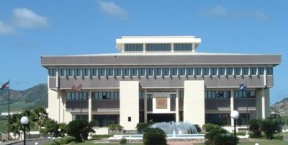Transcript of a Press Conference on the Regional Outlook held at the Eastern Caribbean Central Bank (ECCB)
December 7, 2005
At the Eastern Caribbean Central Bank (ECCB)
December 7, 2005
Participants:
Mr. Agustín Carstens, Deputy Managing Director, IMF
Sir K. Dwight Venner, Governor of the ECCB
Mr. Anoop Singh, Director, Western Hemisphere Department, IMF
Ms. Ratna Sahay, Assistant Director, Western Hemisphere Department, IMF

ECCB building, St. Kitts
Venner: Since we have a multi-island audience for this press conference, we have to be extremely disciplined. If colleagues in other islands don't mind, I'll start with the host territory and then go down the chain of islands. So we start with Gus Williams in St. Kitts and Nevis. Remember, Gus, that your questions must be questions and not long comments.
And speak up, you have to throw your voice all the way down to Grenada.
Questioner: One of the shocks that affects us is high oil prices. Would the IMF consider funding technical assistance so that the islands can take advantage of their abundant resources and develop renewable energy from the sun, wind and other sources?

Mr. Carstens, Governor Venner
Carstens: Thank you very much for this interesting question. The question of how to augment the supply of energy in your countries is an important one, but it falls outside the realm of expertise of the IMF.
Our main concern is with macroeconomic stability. This has to do with the monetary and exchange rate framework-which in this region is taken care of by the ECCB-fiscal polices, and financial sector policies. The Fund realizes that macro stability is not an end in itself, but is an intermediate objective to realize higher goals such as output and employment.
The Fund does not work in isolation from the other Bretton Woods institutions [to achieve these goals]. Our sister institution, the World Bank, is involved in sectoral and development aspects. So once we in the IMF leave the ball in terms of achieving macro stability, the other institutions should pick it up and help the countries in their development strategy. So your interesting question falls in the realm of the World Bank and possibly other regional institutions.
Venner: I might add that what the IMF does in its reports is to signal very strongly to the other institutions where they need to come in and pick up the ball. Question from Anguilla?
Questioner: This is Heart Beat Radio. I hope that between Mr. Singh and Mr. Carstens I can get an answer ...
Venner: I am between Mr. Singh and Mr. Carstens. You want me to answer?

Mr. Carstens, Governor Venner, Mr. Singh
Questioner: Well, mention was made of the current account deficits, the increasing public debt, actual and potential currency devaluation, although growth was cited as being good. What advice would you give ECCU members to get out of this vicious cycle?
Carstens: First of all, I want to make a clarification. Neither Mr. Singh nor I talked about a currency devaluation.
Questioner: Mr. Singh talked about it as a stimulus to growth.
Singh: Let me clarify that. What I said was that the currency board arrangement has in fact been a very good anchor. But the U.S. dollar, to which the EC dollar is tied, has depreciated. This has meant, in real effective terms, a depreciation of the EC dollar. And it is that depreciation that has acted as a stimulus to growth.
Carstens: As I mentioned in my opening remarks, we feel that countries need to make efforts to consolidate their fiscal stance and reduce the debt-to-GDP ratio so that it is substantially closer to the 60 percent established in some agreements. Why is this important? For several reasons. First, excessive government expenditure is at times not effective. Often it goes too much into wages or activities that are not very productive. Second, the servicing of the debt can absorb a very important part of the public resources. Third, government borrowing can crowd out private sector investment.
Also, the government needs to channel its resources to more productive uses. To excel in a globalized world, you need to preserve and enhance your human capital, so as to insert yourself on better terms into the services sector. You also need infrastructure to help you diversify your activities and not be so vulnerable to so many shocks.
So it's a combination of reallocation of government resources to make them more effective and a better alignment of expenditures with income so that through time you are reducing the debt-to-GDP ratio. Otherwise the situation would be unsustainable.
The countries in the region are at different stages in addressing the problem. There are countries that are already taking measures. But for all countries this is a good time to adopt these adjustment policies. Right now you have some options; you have some ways to design the adjustment program that is most convenient situation for your country. But if the debt situation continues to deteriorate, in some countries the options and degrees of freedom will disappear. Then it will be a more difficult situation. So this is a good time to reinforce many of the actions that many governments have undertaken to correct the stance of public finances.
Venner: Antigua and Barbuda?
Questioner: Nikisha Smith, Antigua Sun newspaper. At the WTO negotiations in Hong Kong, the topic of [cuts in] subsidies to agricultural industries in the developed countries will be discussed. What can the Caribbean countries do to protect themselves?
Carstens: I think I already mentioned the importance of diversifying the sources of growth. As the gentleman from St. Kitts implied, the islands are blessed with [warm] weather and natural beauty-you certainly can capitalize far more on that.
I also think that you have high quality human capital. Your have a high level of education. Your native language is English, which is an asset in this globalized world. There are many advantages that you have that would allow you to look into different activities to substitute for some of the traditional agricultural activities in which, under the new arrangements in the international arena, you are just not competitive. That is something that you have to face.
The globalized world is one in which there are lot of benefits but there are also some challenges. Those challenges really can be faced when economies are flexible and when government intervention is concentrated on empowering people to be able to face that [global] competition. And I think many governments are doing so already.
Now, that doesn't mean that the government should not take care of people who are being affected in the transition [out of old activities]. In the period of transition, the government should reinforce social safety nets. But it has to be done in a way that is sustainable and gets you out of the fiscal problem. So again, fiscal discipline and the more efficient use of government resources is of the essence.
Yesterday, Prime Minister Douglas delineated to us his strategy of dealing with the sugar transition here in St. Kitts and Nevis. We found that it was an integral strategy, it was a well thought-out strategy. The government was on top of the issue and I think the strategy has very strong potential to be successful, and this [success] could be used an example in other islands who have to undertake these very important transformations.
Venner: Dominica?
Questioner: Good afternoon, my name is Mat Pelier from the Times newspaper. I want to ask a question regarding Dominica's economy. How well are we doing now? And do you think there are any economies in the immediate region that one should be worried about given Dominica's fiscal situation in the last two years?
Carstens: I think that Dominica is doing much better. You have been undertaking a very strong adjustment program and you have taken very courageous measures. You have been following a very constructive dialogue with external creditors. With the fiscal efforts you have done-on the revenue side and on the expenditure side-your debt and fiscal balances are now more in control. So I think that the macro framework has improved substantially through time.
And this has paid off, because growth has been reviving. So in terms of employment creation the picture has certainly been improving. And to underline the need for higher growth we have been advocating additional structural reforms, like in the utilities sector, to bring about some additional private investment.
But, to summarize, in terms of where we are I would say 'so far, so good'. The program that you have been undertaking in the last few years has been very successful. It has not simple or easy for the country to handle. So we commend the authorities and the people of Dominica for all the efforts they have been doing in the last few years.
Venner: Grenada?
Questioner: This is George Grant, representing Grant Communications here in Grenada. My question has to do with the PetroCaribe deal. Some analysts are saying that this could possibly affect debt in the coming years. And I understand that part of the purpose of your trip is to find out a little bit more about PetroCaribe. Can you tell us what you have found out so far and would you go as far as to suggest to these islands what they ought to be looking for out of this PetroCaribe deal?
Carstens: OK, thank you very much. I have to say that the PetroCaribe proposal has not been the focus of my conversations with the authorities; I think there are many more aspects in our relationship than that deal.
We don't know many of the details of this proposal. I think that the countries have to analyze it carefully. Basically they have to evaluate the convenience of this offer in terms of how it affects their overall macroeconomic picture. Because, yes, it would imply more debt. It might imply the government getting involved in the energy sector. It might imply certain commitments with respect to social expenditures; that by itself is not wrong at all.
So at the end of the day I would say that I have come to the conclusion that it is a option that governments have, and obviously all options are good. Now it's up to governments to decide what's best for them. We cannot really decide for them. But our recommendation would be to look and analyze seriously this option and weigh it for the impact on debt, on social expenditures, and on the involvement of the government in some sectors where they might not be involved today. So I'd say its an open question at the moment and I would say that the IMF would be very respectful of any decisions that the countries might take.
Venner: At the last meeting of the ECCB Monetary Council, the ECCB was asked to present a paper on the question of energy prices. And at the OECS Authority meeting in Anguilla, these matters were discussed. So as we speak there's a lot of analysis going on-Mr. Carstens did not mention this as he could not have been privy to this-as to what the options are and whether we should take them. Because we are faced with a very significant increase in the price of oil. One decision is that the price has to pass through. Of course governments are obligated to see to what extent the impact of this can be cushioned. So if people put forward options responsible governments have to sit down and think about them very carefully before they take decisions. Monserrat?
Questioner: Denzil Edgecombe, People's Television. Looking at the growth figures Mr. Singh presented, it appears that we are losing ground relative to other developing regions, such as in Asia. I'd like to know how you feel about this, especially knowing that at this time, as in the past, we continue to lose people to more developed countries.
Carstens: I will make a brief comment and then turn it over to Mr. Singh. I think that in some of the other developing regions, such as in Asia, savings-including public savings-have been much higher. That has allowed them to make their economies better prepared to face globalization and have resources for more productive development. So I think that this aspect of fiscal discipline-that it generates additional savings, more productive investment, and a more productive labor force-would pay off in this region. I also think that to make the economy more flexible to face particular shocks it would be important to have more flexible labor markets. Mr. Singh?
Singh: I think that my figures were for the Latin America and Caribbean region as a whole. While the region's recent growth performance has been good, it is-as you noted-low by international comparison, below not only emerging Asia but also all developing countries taken as a group. As I mentioned in my remarks, this points to the significant scope in the region for strong policies to create the environment that is needed for private sector-led growth to take off.
Now in the Caribbean, the challenge is to overcome the decline in growth rates that has occurred since the early 1990s. The Caribbean has many advantages: attractive tourist destinations, strong democracies, and a well educated labor force. What is needed, as Mr. Carstens mentioned, are a more diversified activities and greater flexibility. And the more open the region is to private investment the easier it will to make these shifts. That is the essential point as we look ahead to the clear potential for faster growth rates in the region.
Venner: St. Lucia?
Questioner: Jason Sifflet from the Star Newspaper. I wanted to ask Mr. Carstens: you say that the model of [public sector-led] development is not sustainable, but you also say that this does not mean that the government must stop caring about its people. I can see our government leaders listening to this and thinking: 'How can I meet the social goals and the growth targets without increasing the public debt?' And I'd like to ask Mr. Venner: if the slow pace of integration right now is largely a matter of lack of political will, how successful can the central bank's less-than-political strategies be in terms of achieving our goals-the goals that the central bank sets up but that the islands consistently fail to achieve.
Carstens: I don't want to generalize but in some islands the government has been the employer of last resort. The government would not have to be doing this task if you were able to generate more private sector jobs, which would certainly generate a sustainable source of income for people.
There is also the issue of how you can spend government resources in a more effective way. I think that there is scope for making government expenditures more efficient, both capital expenditures and current expenditures. If you have better targeted expenditures for the social safety net, that would allow you to consolidate the fiscal framework and bring the debt-to-GDP ratio under control. So it's a matter not only of size of expenditures but how you determine the use of your scarce public resources.
I think that if government expenditures go toward empowering people by increasing their human capital, then you can take care of people, you can support private-sector led growth, and at the same time you can bring down the debt in relation to the size of the economy.
Governor Venner, I think the remainder of that question was for you.
(Laughter.)
Venner: Well, the question is well-known to me so I know how to answer it. In terms of what is happening recently, let me just say that the OECS governments have set up a task force on economic union, which for my sins I have been asked to chair. And my view, judging from the caliber of people who have been put on the task force, is that there's a very strong hint from the governments that they need to move substantially in this area. We have put forward to them certain propositions on centralizing policymaking and greater executive power, for example, for the OECS Secretariat. My view is that there is at this stage considerable movement on the issue and next year, which is the 25th anniversary of the OECS Treaty, when we have agreed to meet here in Basseterre next June, there will be significant movement over that period. I just hope to enlist the assistance of all friendly and willing sources like the questioner in what everyone agrees is the right way to go. But we can't leave it to the politicians alone; we are all citizens of the union and we can't disenfranchise ourselves.
Any questions from St. Vincent and the Grenadines? I know you are busy there today [with elections] but was someone able to spare a few minutes.
Questioner: There's only me, Governor.
(Laughter.)
We may have to give preference to the journalists from the other territories, Governor, ours are too busy voting.
Venner: I hope that you voted already.
Questioner: Not as yet. I have two more hours to make the polls.
Venner: Yours may be the deciding vote.
Questioner: I hope so, Governor.
(Laughter.)
Venner: You know in the [soccer] World Cup Trinidad and Tobago got in because of a wild card. Maybe we can give the wild card question to St. Kitts and Nevis since they are so loyally assembled here. It's between Mr. Blanchette and Mrs. Callendar.
[Mr. Blanchette indicates he will yield the floor to Mrs. Callendar.]
Questioner: I'm Lorna Callendar from The Democrat Newspaper. Let me first say I'm not an economist. But I remember that in the talk given here by Professor Stiglitz, the Nobel Prize winner, he said that often when the countries are getting richer, the people are getting poorer. And I've noted in the Caribbean countries I've lived in that when the Prime Ministers stated that the country was in a state of economic growth, the people were in a state of utter disbelief. I want to know what causes such a state of affairs?
Carstens: Well, that question can take us hours ...
(Laughter.)
What would lead to what we might call 'inclusive growth'? How could the growth process include as many people as possible?
I mentioned that government expenditure should empower people, giving them the capacities to participate in the economy, to be creative, to satisfy real demands for services or goods. So from my point of view that is the key: giving more people the ability to participate, which leads to a better income distribution in the country. Economic growth is good, but is better when it is shared by as many people as possible.
Another condition is when you have less monopoly. When there is free access to let in the most competitive, the public benefits by getting much better services at a much lower price.
So empowering people and more competition are essential to having a more democratic growth process. Of course there are details in each economy that make it difficult to generalize but those are the elements that I would point out as essential.

Ms. Sahay, Mr. Carstens, Governor Venner
Venner: Let me thank Mr. Carstens, Mr. Singh, Ms. Sahay and the IMF team and most of all, you in the audience, for participating.
IMF EXTERNAL RELATIONS DEPARTMENT
| Public Affairs | Media Relations | |||
|---|---|---|---|---|
| E-mail: | publicaffairs@imf.org | E-mail: | media@imf.org | |
| Fax: | 202-623-6278 | Phone: | 202-623-7100 | |


